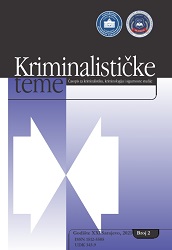Pregled teorija razvojne i kriminologije životnog toka
Developmental and Life-Course Criminology Theory: A Literature Review
Author(s): Mirza BuljubašićSubject(s): Behaviorism, Criminology
Published by: Fakultet za kriminalistiku, kriminologiju i sigurnosne studije Univerziteta u Sarajevu
Keywords: theory; development; life-course; criminology; developmental criminology;
Summary/Abstract: The paper reviews certain criminological life course theories. The theory of developmental pathways is based on specific trajectories that gradually, during development, lead to criminal behaviour. The age-graded theory of informal social control explains the influence of social institutions during the life course on the occurrence of criminal behaviour. The interactional theory finds that delinquency has its roots in weak social ties and delinquent networks; it is part of reciprocal continuous relationships during the life course. The dual taxonomy theory explains the continuity and changes in criminal careers and identifies two types of perpetrators. The integrative multi-layered control theory explains the development of criminal behaviour, events and crime rates through the integration of classical criminological theories. The situational action theory states that during development criminal behaviour is part of moral action. The developmental propensity theory considers the correlates of genetics and environment to delinquent behaviour. The integrated cognitive antisocial potential theory incorporates traditional criminological theories aiming to explain the unique potential for antisocial action that can lead to criminal behaviour during development.
Journal: Kriminalističke teme – Časopis za kriminalistiku, kriminologiju i sigurnosne studije
- Issue Year: XXI/2021
- Issue No: 2
- Page Range: 21-42
- Page Count: 22
- Language: Bosnian

